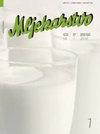Prevalence of mastitis in Algerian dromedary camels and antimicrobial resistance of the causative Staphylococci
IF 1.1
4区 农林科学
Q3 AGRICULTURE, DAIRY & ANIMAL SCIENCE
引用次数: 0
Abstract
To investigate the prevalence, bacterial spectrum of mastitis, and antimicrobial resistance of the causative staphylococci in Algerian dromedary camels, a total of 200 lactating camels were first examined for clinical mastitis and the healthy quarters were examined for subclinical mastitis using the California Mastitis Test (CMT). Milk samples from the affected quarters were collected aseptically and analysed using conventional bacteriological isolation and identification procedures. Staphylococcal isolates were then analysed for antimicrobial resistance. The overall prevalence of mastitis in camels based on CMT and clinical examination was 35 % (70/200), of which 7.5 % (15/200) was clinical mastitis and 27.5 % (55/200) was subclinical mastitis. At the quarterly level, the overall prevalence was 11.87 % (95/800), of which 2.62 % (21/800) was clinical mastitis and 9.25 % (74/800) was subclinical mastitis. A total of 98 bacterial isolates were identified from the 95 cultured milk samples. Staphylococci (70.4%) were the predominant isolates, with 31.63 % identified as coagulase-positive staphylococci (CPS) including S. aureus at 25.51 % and 38.77 % identified as coagulase-negative staphylococci (CNS). The remaining isolates were Micrococcus sp., Streptococcus sp., Bacillus sp., E. coli, and Enterococcus. Antibiotic susceptibility testing revealed that 24 (34.78 %) of the isolates were susceptible to all antimicrobial drugs tested, while 21.73 % (15/69) were multidrug resistant strains. The highest resistance rates were found for penicillin, tetracycline and erythromycin with 33.33 %, 31.48 % and 21.74 %, respectively. Therefore, the implementation of integrated approaches in the study is of great importance for the prevention and control of mastitis to improve the quality of camel milk, minimize economic losses and avoid significant public health risks.阿尔及利亚单峰骆驼乳腺炎的流行和致病葡萄球菌的抗菌素耐药性
为了调查阿尔及利亚单峰骆驼乳腺炎的患病率、乳腺炎的细菌谱和致病菌葡萄球菌的抗菌素耐药性,首先使用加利福尼亚乳腺炎试验(CMT)对200只哺乳期骆驼进行临床乳腺炎检查,并对健康骆驼进行亚临床乳腺炎检查。从受影响的宿舍收集牛奶样本,并使用传统的细菌分离和鉴定程序进行分析。然后分析葡萄球菌分离株的抗菌素耐药性。基于CMT和临床检查的骆驼乳腺炎总体患病率为35%(70/200),其中7.5%(15/200)为临床乳腺炎,27.5%(55/200)为亚临床乳腺炎。在季度水平上,总体患病率为11.87%(95/800),其中2.62%(21/800)为临床乳腺炎,9.25%(74/800)为亚临床乳腺炎。从95份培养乳样品中共分离出98株细菌。以葡萄球菌(70.4%)为优势菌株,其中凝固酶阳性葡萄球菌(CPS)占31.63%,金黄色葡萄球菌(25.51%)和凝固酶阴性葡萄球菌(CNS)占38.77%。其余分离株为微球菌、链球菌、芽孢杆菌、大肠杆菌和肠球菌。药敏试验结果显示,24株(34.78%)对全部抗菌药物敏感,21.73%(15/69)为多药耐药菌株。青霉素、四环素和红霉素的耐药率最高,分别为33.33%、31.48%和21.74%。因此,在本研究中实施综合措施,对于提高骆驼奶质量,减少经济损失,避免重大公共卫生风险,防治乳腺炎具有重要意义。
本文章由计算机程序翻译,如有差异,请以英文原文为准。
求助全文
约1分钟内获得全文
求助全文
来源期刊

Mljekarstvo
Agricultural and Biological Sciences-Animal Science and Zoology
CiteScore
1.90
自引率
41.70%
发文量
18
审稿时长
12 weeks
期刊介绍:
Mljekarstvo is an open access, peer-reviewed international quarterly scientific journal. The first issue was published in 1951, by the Croatian Dairy Operators'' Association (today: Croatian Dairy Union, publisher). In a paper at a Union conference held 28 October 1951 in Zagreb it was said: "Our desire is that this magazine does not meet the fate of its predecessors, but that it continues to reflect the creative efforts and to provide guidelines for the producers as well as all other operators employed in the dairy industry."
It is our pleasure today to say that wishes of the enthusiasts who attended the conference have come true, and the magazine Mljekarstvo during the last six decades was a reflection of the creative efforts of numerous dairy scientists and experts, and through its texts it served as a guideline in improving production and processing of milk and dairy products. Mljekarstvo has been following all the achievements of the dairy profession in Croatia, and it also gives the short surveys of world achievements. The result of the research of local and foreign scientists and experts always find their place in the magazine Mljekarstvo. It has been edited by our outstanding dairy experts employed at colleges, research institutions and dairy companies.
 求助内容:
求助内容: 应助结果提醒方式:
应助结果提醒方式:


